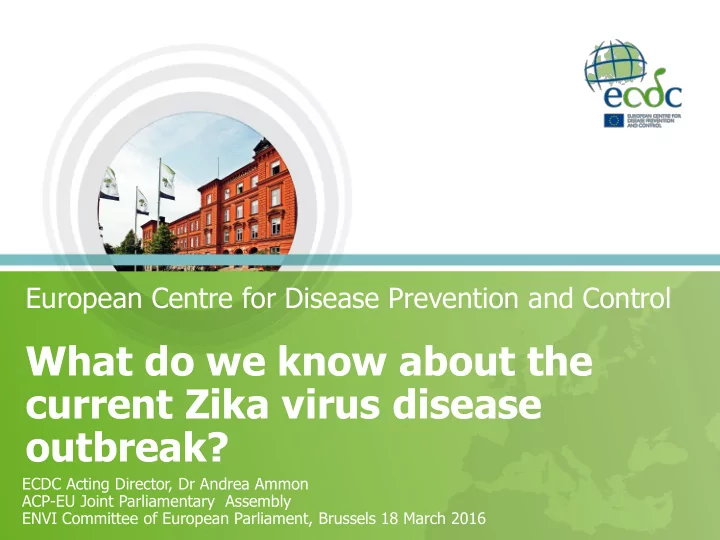

European Centre for Disease Prevention and Control What do we know about the current Zika virus disease outbreak? ECDC Acting Director, Dr Andrea Ammon ACP-EU Joint Parliamentary Assembly ENVI Committee of European Parliament, Brussels 18 March 2016
Disease prevention and control in the EU European Union (EU) 28 Member States EEA/EFTA Stock- Iceland, holm Norway, Liechtenstein Brussels Luxemburg
Core functions of ECDC Every working day at 11:30 a.m., a roundtable meeting in ECDC’s Emergency Operations Centre assesses threats, official alerts and epidemic intelligence. Disease surveillance • Epidemic intelligence • Risk assessment • Scientific advice and • guidance Response support • Preparedness and • capacity strengthening Training • Photo: ECDC 3
Zika virus distribution in Africa and Asia, and spread in the Pacific region from 2007 Uganda, Zika forest, isolation from Malaysia, isolation from Aedes a monkey, 1947, African lineage mosquitoes , 1966, Asian lineage Americas, 2015 WHO, published 9 February 2016. Available from http://www.who.int/bulletin/online_first/16-171082.pdf ECDC, 19 February 2016
Timeline: current situation as of 10 March ECDC - http://ecdc.europa.eu/en/healthtopics/zika_virus_infection/zika-outbreak/Pages/Zika-countries-with-transmission.aspx ECDC, 19 February 2016
Zika virus infection Close to dengue 80% asymptomatic infections Complications: Guillain – Barré syndrome (2013-2014, French Polynesia) Pregnancy outcomes: microcephaly and congenital CNS malformations (2014, French Polynesia; 2015, Brazil) Diagnosis: RT-PCR for ZIKV-RNA serology (cross-reactivity!) ECDC, 19 February 2016
Uncertainties and new challenges (1) Uncertainties and new Knowns challenges Circulation in Africa and Asia, Since 2007 large spread in naïve without large outbreak reported human populations (Pacific and Epidemiology Americas) African and Asian Zika virus Asian Zika virus lineage lineages Trans-placental transmission Vector-borne transmission Sexual transmission through semen Mode of transmission (same Aedes mosquitoes than for dengue) Potential risk of transmission via blood transfusion ECDC, 19 February 2016
Uncertainties and new challenges (2) Uncertainties and new Knowns challenges Pregnancy outcomes: microcephaly and congenital CNS malformations Self-limiting illness (4-7 days); Disease outcome 80% asymptomatic forms Neurological disorders: Guillain – Barré syndrome Treatment/prevention No treatment, no vaccine Vector control Limited tools, resistance to biocides measures ECDC, 19 February 2016
Zika virus infection in the ACP Declared a Public Health Emergency of International Concern (PHEIC) on 1 February 2016 by the WHO: • Old disease in many ACPs • New emerging threat in the Pacific and the Caribbean regions with appearance of severe complications. A concern for all affected countries and a need to federate research efforts and harmonize investigations for: • A better understanding of the disease and its ways of transmission, • An early detection and implementation of effective control measures • Development of preventive tools including vaccine with specific focus on pregnant women. 9
Preparedness on Zika includes: • strengthening surveillance systems to ensure early detection and rapid notification of cases • reviewing contingency plans for mosquito-borne outbreaks to ensure rapid vector control measures around imported cases in areas with competent vectors • strengthening intersectoral collaboration and promoting community involvement for the control of the Aedes mosquito vectors of Zika virus • strengthening integrated mosquito surveillance , including invasive species • Modelling potential scenarios of Zika virus spread in the EU/EEA through interactions with other EU agencies, and research projects 10
Response by ECDC Supporting documents Rapid risk assessments • Epidemiological updates • Factsheets for health professionals • Interim technical guidance and EU case definition • Collaboration with CDC and WHO • 11 ECDC, 19 February 2016
Thank you!
Recommend
More recommend